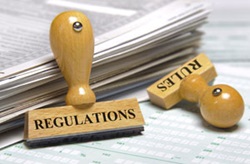CPA Exam’s Regulation Section: Why It Is More Vital than You Think
CPAs are taking on ever-increasing consultative roles as they are being asked to advise in areas beyond traditional financial reporting. To measure proficiency in some of these expanding duties, the CPA Exam has its Regulation (REG) section to ensure CPA Exam candidates have a basic understanding of basic business law, taxation of property transactions, among other areas.
 By Christopher Lee, CPA, MSA
By Christopher Lee, CPA, MSA
The CPA profession is taking on an ever-increasing consultative role as professionals are being asked to advise in areas beyond traditional financial reporting. Maybe you’re starting to hear questions such as the following:
- “John, what is the best way to structure my new business?”
- “Jenny, what are the effects of a credit versus a deduction?”
- “Allison, do I really need an attorney to memorialize that verbal agreement?”
To measure proficiency in some of these expanding duties, the CPA Exam has its Regulation (REG) section. The REG section exists to ensure CPA Exam candidates have a basic understanding of the regulatory environment: basic business law, taxation of property transactions, taxation of individuals, and taxation of business entities.
 Many CPA candidates believe they will pursue a career in auditing, assurance, or financial reporting, so they see little value in the topics tested in the REG section of the exam. Still, the best professionals are those who know what they don’t know: and that’s where the REG section comes in. It ensures that future CPAs have enough legal and tax basic knowledge to recognize these issues when they arise and to seek specialized help before problems ensue.
Many CPA candidates believe they will pursue a career in auditing, assurance, or financial reporting, so they see little value in the topics tested in the REG section of the exam. Still, the best professionals are those who know what they don’t know: and that’s where the REG section comes in. It ensures that future CPAs have enough legal and tax basic knowledge to recognize these issues when they arise and to seek specialized help before problems ensue.
Furthermore, the career of a CPA can take more twists and turns than ever before, and individuals may find themselves unexpectedly functioning as tax advisers. While the nuances and details of tax law change frequently, many principles often remain the same. Thus, the concepts learned while preparing for the exam may make an unexpected revival in the future as a CPA draws on previously tested knowledge.
Finally, as taxpayers, CPAs will find the knowledge gained in preparing for the CPA Exam will have a direct carryover benefit to their personal tax and financial planning endeavors. With the knowledge and understanding gained through the exam process, individual CPAs are better prepared to pursue their own financial goals with a mindfulness of tax efficiency.
For CPA Exam candidates less interested in the REG section, take note of the points above. The concepts and principles learned may apply in unexpected ways. Study hard, learn well, and crush the exam!
Christopher Lee, CPA, MSA, is a manager of tax and advisory content for Surgent. Additionally, he serves as associate faculty for the Indiana University Kelley School of Business, teaching a variety of courses in the accounting department. He can be reached at leec@knowfully.com.
Sign up for weekly professional and technical updates from PICPA's blogs, podcasts, and discussion board topics by completing this form.
PICPA Staff Contributors
Disclaimer
Statements of fact and opinion are the authors’ responsibility alone and do not imply an opinion on the part of PICPA officers or members. The information contained in herein does not constitute accounting, legal, or professional advice. For professional advice, please engage or consult a qualified professional.






